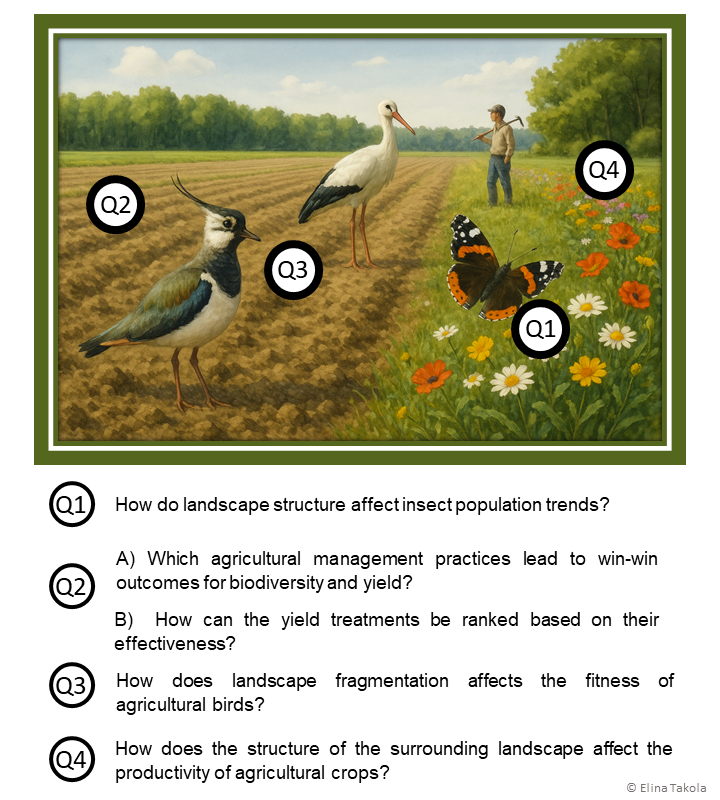Postdoctoral researcher & Group leader of BIOECOS
Dr. Elina (Eleni Elda) Takola
"I am a Greek ecologist and meta-analyst leading the BIOECOS group at Helmholtz Centre for Environmental Research – UFZ (Leipzig, Germany). My research focuses on cross-scale data syntheses to explore organism-environment relationships and actively applies open science principles. My ResearchGate Interest Score ranks among the top 1% of members who first published in 2020. As of 2024, I have co-authored papers with researchers across all permanently inhabited continents. My current research focuses on the effect of landscape complexity on agricultural production, on the synergies between biodiversity and productivity, on the evaluation of policy frameworks and on the relationships of animals with their environment."
Contact/ Adress
Dr. Elina Takola
Postdoctoral researcher
Department of Computational Landscape Ecology
Helmholtz-Zentrum
für Umweltforschung - UFZ
Permoserstr. 15, 04318 Leipzig


| 2024 - heute | Group leader of BIOECOS group Helmholtz-Zentrum für Umweltforschung – UFZ Department of Computational Landscape Ecology |
| 2022 - 2024 |
Postdoctoral researcher in Helmholtz-Centre for Environmental Research-UFZ Department of Computational Landscape Ecology (BIOECOS research group) |
| 2018 - 2022 |
PhD student in Friedrich-Schiller University of Jena, Germany (supervisor: Prof. Holger Schielzeth) This research was funded by the German Research Foundation (DFG) as part of the SFB-TRR 212: "A Novel Synthesis of Individualisation across Behaviour, Ecology and Evolution: Niche Choice, Niche Conformance, Niche Construction" (NC3; funding INST 215/543-1, 396782608). PhD thesis: “Scaling down the ecological niche from populations to individuals: an evidence synthesis approach” |
| 2018 |
ERASMUS Internship in the University of Glasgow (Scotland), Institute of Biodiversity, Animal Health and Comparative Medicine (advisor: Prof. Jason Matthiopoulos) • Project title: Environmental niche modelling of the black grouse (Lyrurus tetrix) |
| 2016 - 2018 |
Master student in the Aristotle University of Thessaloniki, Greece (supervisor: Prof. Dimitrios Bakaloudis) MSc Thesis: “Herpetofauna-habitat relationships in the suburban forest of Thessaloniki” |
|
2010 - 2016 |
Bachelor student in the Aristotle University of Thessaloniki, Greece (supervisor: Prof. Dimitrios Bakaloudis) BSc thesis: Population structure and morphometric traits of Hermann’s (Testudo hermanni) and spur-thighed tortoise (Testudo graeca) in the suburban forest of Thessaloniki |
| June 2025 |
Martin-Luther University of Halle-Wittenberg PI: Prof. Claudia Fricke "Modelling species-habitat relationships across scales for nature conservation" |
| February 2025 |
National and Kapodistrian University of Athens PI: Prof. Panagiotis Pafilis "An Introduction to meta-analyses and evidence syntheses" (in Greek) |
| February 2025 |
HCMR Hellenic Centre for Marine Research "An Introduction to meta-analyses and evidence syntheses" (in Greek) |
|
April-July 2020 & April-July 2022 |
Friedrich-Schiller University of Jena Course Assistant PI: Prof. Holger Schielzeth • Einflussreiche Publikationen in der Ökologie / Classic Papers in Ecology (MEES021/E16) |
|
November 2021 – January 2022 & November 2022 – January 2023 |
Friedrich-Schiller University of Jena Course Assistant PI: Prof. Stefan Halle • Ecological Concepts 1: Current Fields of Ecological Research (E15) |
| November – December 2021 |
Max Planck for Evolutionary Anthropology/University of Leipzig Practical Course Assistant PI: Prof. Anja Widdig • "Module 11-BIO-0804: Primate Behavioral Ecology" |
|
October 2021 & October 2022 |
Friedrich-Schiller University of Jena Course Assistant PI: Prof. Holger Schielzeth • Praktikum Evolutionsbiologie (BB006) (Prof. Schielzeth was awarded the Lehrpreis 2022 der Universität Jena / Teaching award by University of Jena for this course) |
| November 2020 |
Friedrich-Schiller University of Jena Graduate Academy (Qualification Programme) • Meta-analysis course |
- 2025: Invited talk at the German Centre for Integrative Biodiversity Research (iDiv).
- 2025: Invited talk "Introduction to meta-analysis" at the Hellenic Centre for Marine Research - HCMR (Greece).
- 2022: Invited talk “Hutchinson’s ecological niche for individuals” at the Technical University of Munich (N. Dingemanse’s Lab).
- 2022: “NC³ - Individualized niches; theory and practices”, talk on the 05th of April 2022 in the Symposium InChangE, NC3 and JICE (Bielefeld University, Germany).
- 2018: ERASMUS placement in the University of Glasgow (Scotland).
Esguerra, J. (2025). Habitat selection of northern lapwing (Vanellus vanellus) during breeding season in Europe. [MSc thesis, Hochschule für Technik Stuttgart].
Ferdous, J. (2025). Individual-Based Modelling Application for Intraspecific Variation in Habitat Selection of White Storks (Ciconia ciconia) in Central Europe. [MSc thesis, TU Dresden].
Resch, L. (2026). Insect abundance trends analysis using multi-variate analyses. [MSc thesis, University of Leipzig].
Dittmann, J. (2026). Temporal trends of herpetofauna IUCN status. [BSc thesis, University of Leipzig].
| 2021 | Poster prize in GfÖ annual meeting |
| 2019 |
Poster Prize in DZG Meeting (Behavioural Biology section) |
| 2016 |
Honor/Commendation of excellence Awarded by the Aristotle University of Thessaloniki for excelling in undergraduate studies |
| 2010 |
Award and Honor/Commendation of excellence Awarded by the Aristotle University of Thessaloniki for entering with the highest grade in the School of Forestry and Natural Environment |
I use meta-analyses and evidence syntheses to examine the relationships between organisms and their environment. My past research was revolving around Behavioural Ecology and niche individual specialization. My current research focuses on exploring the impact of landscape heterogeneity on species' resource use and how this ultimately affects biodiversity patterns. In addition, I am interested in unveiling how landscape dynamics affect the effectiveness of conservation measures. My goal is to help bridging the conservation gap and produce useful research.
I am a strong advocate of open science practices and an active member of the Society for Open Reliable Transparent Ecology and Evolutionary biology-SORTEE (since 2021). I believe that knowledge should be free and accessible to everyone. Since science and ecology are inherently political, we should coordinate our efforts to protect the environment from corporate depredation and administrational lethargy. My research is committed to promoting inclusion, accessibility and interdisciplinarity, while renouncing helicopter research and scientific misconduct.
Takola, E. (2024) Debunking myths around open data. Available at: https://www.sortee.org/blog/2024/04/12/2024_open_data_myths/
Contribution to the translation of CRediT statement in Greek.
Takola, E. (2025). Organising projects for reproducibility. In N. Cooper & P.-Y. Hsing (Eds.), A Guide to Reproducible Code in Ecology and Evolution (pp. 3-9). British Ecological Society. https://www.britishecologicalsociety.org
Links to data and code are provided, wherever applicable.
Esguerra, J., Grimm-Seyfarth, A., Frenzel, M. & Takola, E. (2025). Tracking the hidden niches: Movement-based insights into northern lapwing intraspecific variation and conservation. (under review)
[Data & code available here. Preprint available here.]
Ivimey-Cook, E., Sánchez-Tójar, A., Berberi, I., ..., Takola, E., ..., Zeiss, R. & Moran, N. (2025). From Policy to Practice: Progress towards Data- and Code-Sharing in Ecology and Evolution. (under review)
[Preprint available here.]
Takola, E., Korell, L., Bonfanti, J., Beckmann, M., Reitz, T. & Tamburini, G. (2025). Does sustainable agriculture promote biodiversity and yield? A second-order meta-analysis. (under review)
[Data & code available here. Preprint available here.]
Lagisz, M., Bairos-Novak, K. R., Martinig, A. R., Bertram, M., Mizuno, A., Sabet, S. S., ..., Takola, E., ... & Nakagawa, S. (2025). Priced out of belonging? Insufficient concessions on membership fees across international societies in ecology and evolution. Proceedings of the Royal Society B: Biological Sciences, 292: 20241430. https://doi.org/10.1098/rspb.2024.1430
Noble, D. W., Xirocostas, Z. A., Wu, N. C., Martinig, A. R., Almeida, R. A., Bairos-Novak, K. R., ..., Takola, E., ... & Lagisz, M. (2025) The promise of community-driven preprints in ecology and evolution. Proceedings of the Royal Society B: Biological Sciences, vol. 292, no. 2039. https://doi.org/10.1098/rspb.2024.1487
Gould, E., Fraser, H.S., Parker, T.H., Nakagawa, S., Griffith, S.C., Vesk, P.A., Fidler, F.,..., Takola, E.,... & Tompkins, E. (2025). Same data, different analysts: variation in effect sizes due to analytical decisions in ecology and evolutionary biology. BMC Biology 23, 35. https://doi.org/10.1186/s12915-024-02101-x
[Data & code available here.]
Anochirim, M., Grainger, M., Stewart, G. & Takola, E. (2024). The implementation of network meta-analysis in Ecology; a case study using crop yield data. (under review)
[Data & code available here. Preprint available here.]
Takola, E., Bonfanti, J., Seppelt, R. & Beckmann, M. (2023). An open-access global database of meta-analyses investigating yield and biodiversity responses to different management practices. Data in Brief, p. 109696. https://doi.org/10.1016/j.dib.2023.109696
[Data and code available here.]
Takola, E. & Schielzeth, H. (2022). Hutchinson’s ecological niche for individuals. Biology & Philosophy, 37, 25. https://doi.org/10.1007/s10539-022-09849-y
Trappes, R., Nematipour, B., Kaiser, M. I., Krohs, U., van Benthem, K. J., Ernst, U. R., Gadau, J., Korsten, P., Kurtz, J., Schielzeth, H., Schmoll, T. & Takola, E. (2022). How Individualized Niches Arise: Defining Mechanisms of Niche Construction, Niche Choice and Niche Conformance. BioScience, 2022, biac023, https://doi.org/10.1093/biosci/biac023
Takola, E., Krause, E., Müller, C. & Schielzeth, H. (2021). Novelty at second glance: a critical appraisal of the novel object paradigm based on meta-analysis. Animal Behaviour, 180, 123-142. https://doi.org/10.1016/j.anbehav.2021.07.018
[Data and code available here.]
Moran, N., Caspers, B., Chakarov, N., Ernst, U., Fricke, C., Kurtz, J., Lilie, N., Ka Lo, L., Müller, C., R, R., Takola, E., Trimmer, P., van Benthem, K., Winternitz, J. & Wittmann, M. (2021). Shifts between cooperation and antagonism driven by individual variation: a systematic synthesis review. Oikos. https://doi.org/10.1111/oik.08201
Shcherbinina, E., Doktor, D. & Takola, E. (2025). decimatoR: an R package to convert heterogeneous coordinate formats into decimal degrees (Version 1.0). Zenodo. https://zenodo.org/records/14855698
I am co-organizing the Open CLE Forum, which is one of the regular get-togethers of the CLE Department.
It is open not only to Department members, but also external guests.
The Open CLE Forun comprises of conventional presentations (progress reports or discussion of future plans/brainstorming sessions), round-table discussions, games and many more types of activities. It also includes snacks!
The goal is to sit together, discuss science and ultimately increase the scientific exchange within UFZ.

If you have a project idea and want to work with us, please do not hesitate to contact Dr. Elina Takola.
There are also some ongoing projects, in which we always need extra workforce:
- Can we implement network meta-analysis to uncover the effects of conservation measures on biodiversity?
⇒ Statistically demanding project that explores uncharted territories.
- Evidence syntheses and lessons learned by conservation efforts.
⇒ Detective work and a deep dive in published documents about the effectiveness of conservation efforts in different countries. Not too statistically demanding.
- How does landscape heterogeneity affect population persistence?
⇒ Data-intensive and statistics-heavy project. Requires experience with R or some other programming language.
⇒ Data-intensive and statistics-heavy project. Requires experience with R or some other programming language.

